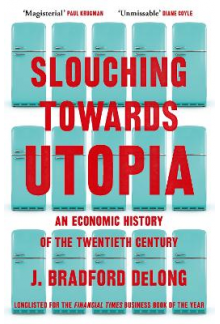- Titulinis
- Dalykinė ir mokslinė literatūra
- Ekonomika, finansai, vadyba
- Slouching Towards Utopia: An Economic History of the Twenti
Brad de Long
Slouching Towards Utopia: An Economic History of the Twenti
Balsavo 0
ISBN: 9781399803434
Autorius : Brad de Long
Leidimo metai: 2023
Leidėjas: John Murray Publishers
Puslapių skaičius: 624
Leidinio kalba: Anglų
Formatas: Minkšti viršeliai
Autorius : Brad de Long
Leidimo metai: 2023
Leidėjas: John Murray Publishers
Puslapių skaičius: 624
Leidinio kalba: Anglų
Formatas: Minkšti viršeliai
Pilna kaina:
18.00 €
- % perkant internetu
Kaina:
Šių parametrų produkto neturime
Likutis pakankamas
Pristatymo terminas Lietuvoje 2-6 savaitės
Pristatymo terminas Lietuvoje 1-4 darbo dienos
Pristatymo terminas Lietuvoje 2-6 savaitės
Pristatymo sąlygos
Aprašymas
AN INSTANT NEW YORK TIMES AND WALL STREET JOURNAL BESTSELLERLONGLISTED FOR THE FINANCIAL TIMES BUSINESS BOOK OF THE YEAR
A FINANCIAL TIMES BEST ECONOMICS BOOK OF THE YEAR AND THE ECONOMIST BOOK OF THE YEAR
From one of the world's leading economists, a sweeping new history of the twentieth century - a century that left us vastly richer, yet still profoundly dissatisfied.
Before 1870, most people lived in dire poverty, the benefits of the slow crawl of invention continually offset by a growing population. Then came a great shift: invention sprinted forward, doubling our technological capabilities each generation, and creatively destroying the economy again and again.
Slouching Towards Utopia tells the story of the major economic and technological shifts of the 20th century in a bold and ambitious, grand narrative. In vivid and compelling detail, DeLong charts the unprecedented explosion of material wealth after 1870 which transformed living standards around the world, freeing humanity from centuries of poverty, but paradoxically has left us now with unprecedented inequality, global warming, and widespread dissatisfaction with the status quo.
How did the long twentieth century fail to deliver the utopia our ancestors believed would be the inevitable result of such material wellbeing?
How did humanity end up less on a march to progress than a slouch in the right direction?
And what can we learn from the past in pursuit of a better world?
Atsiliepimai (0)
Palikite atsiliepimą

